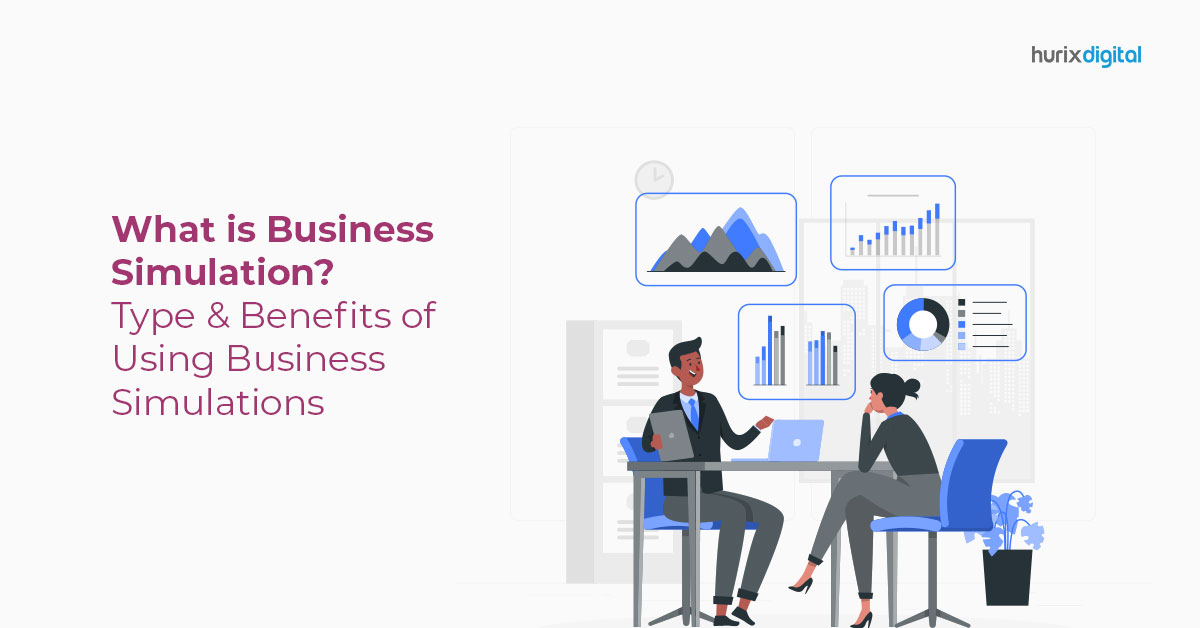
What is Business Simulation? Type & Benefits of Using Business Simulations
Business simulations were formerly relatively unknown technologies, in part due to the high entry and utilization hurdles. However, they have emerged as accessible tools with strategic significance over the last five years or more.
A study published in the Journal of Educational Computing revealed that incorporating a Business Simulation Game enhanced learner engagement and the development of Higher-Order Thinking Skills. An experiment published in Library Hi Tech found a positive correlation between mobile business simulation games and entrepreneurial attitudes and self-efficacy.
Business simulations are potent tools for organizational training and development. They provide a virtual environment where individuals can gain hands-on experience managing multiple aspects of a business.
Participants undertake strategic decisions, analyze outcomes, and learn from their mistakes in a risk-free setting. Here, we will explore the meaning of business simulations, delve into simulation training examples, and highlight their numerous benefits.
Table of Contents:
- What Do You Mean by Business Simulations Explained
- Types of Business Simulations
- Advantages of Employing Business Simulation
- Experiential Learning Develops Practical Skills
- Risk-Free Environment Fosters Decision-Making Skills
- Collaboration and Teamwork for Holistic Business Understanding
- Long-Term Thinking and Strategic Planning
- Gain Understanding of Business Operations
- Build Leadership and Strategic Thinking Skills
- Adapt to Changing Market Conditions
- Get Instant Feedback
- The Bottom Line
What Do You Mean by Business Simulation?
Business simulations are interactive, computer-based programs that mimic real-world business operations, dynamics, and decision-making processes. These immersive experiential tools allow participants to engage in a simulated business environment, offering valuable learning experiences.
Individuals can explore and respond to various strategies within this safe space without the potential risks and associated negative consequences of real-world scenarios. Familiarity with corporate conditions and factors reinforces their business acumen.
A range of exercises and business simulation activities designed to align with the responsibilities associated with their roles within the company require participants to apply their skills and make relevant decisions in a robust, secure environment.
A conduit between learning and real-life application, virtual business simulation facilitates a collective learning experience. This experience enables participants to gain a deeper understanding and engagement with course material, their workplace, and their specific industries.
Also Read: 6 Sales Training Simulations That Address Real-World Challenges
Types of Business Simulations
Depending on the industry, organizations may employ diverse business simulation activities to support professionals in advancing their comprehension and skills in the business domain. Here are some business simulation examples.
1. Strategic Simulations
Strategic simulations focus on performing numerous administrative duties or making managerial choices for various departments to develop participants’ strategic thinking and decision-making skills.
The simulation training may involve participant groups discussing and collaborating to imitate different management teams. It may also consider many such critical strategic choices with others to consolidate their interpersonal communication skills. Business strategy simulations excel in aiding leaders to define their strengths and providing them with insights into potential career paths.
Participants may set long-term objectives, analyze market trends, evaluate competitors, formulate business plans, allocate resources, and adapt their strategies to changing environments. This level of self-awareness is valuable for individuals in understanding themselves and for their current and future employers who can identify opportunities to leverage their talents effectively.
2. Marketing Simulations
Market simulation is a comprehensive approach to exploring different marketing facets, such as product creation, pricing strategies, promotional activities, and distribution methods.
Participants actively conduct market research, devise marketing campaigns, analyze consumer behavior, and utilize their findings to inform decision-making processes.
Marketing simulation training is a valuable tool for individuals to gain insights into the intricate dynamics of the marketplace. Participants may navigate challenging decision-making scenarios under pressure and assess the repercussions of their marketing choices on overall business performance. Businesses embarking on new products or brand launches especially favor marketing simulation.
3. Financial Simulations
Financial simulations enhance participants’ financial literacy and decision-making abilities by simulating monetary scenarios such as budgeting, forecasting, investment decisions, and financial risk management.
These simulations highlight the impact of an organization’s internal financial resolutions by providing practical insights into effective financial management strategies within a business context. Individuals gain a deeper understanding of how organizations can implement cost-cutting measures while maintaining quality and efficiency by participating in business appreciation simulations.
Experiencing the consequences of their financial choices enables participants to comprehend fiscal concepts and their impact on the organization’s bottom line.
4. Operations Simulations
Operations simulations are designed to educate new professionals and support current employees in honing their industry-specific skills, particularly in managing the operational aspects of a business. It includes areas such as production, supply chain management, and logistics.
The simulation immerses participants in situations where they learn how to maximize resources, streamline processes, evaluate the viability of a product, and address risk management and end-user satisfaction while tackling operational challenges through virtual scenarios.
The simulation training works towards helping individuals acquire valuable insights into optimizing resource allocation and production processes and effectively managing inventory.
5. Leadership Simulations
A valuable tool for training managers incorporated in leadership development programs, these simulations offer aspiring leaders the opportunity to gain hands-on experience in maneuvering the intricacies of leading an organization without subjecting the actual company to risks.
Through advanced curriculum and real-world business scenarios, participants explore complex interpersonal dynamics, resolve conflicts, and motivate their team. Leadership simulation training provides a safe space to practice leadership skills, receive feedback for improvement, learn from failures, and acquire valuable skills to accelerate strategic change.
In essence, leadership simulations expedite learning in a highly realistic manner and allow participants ready exposure to apply their practical knowledge to real-world business events.
Also Read: Top 10 eLearning Companies for Corporate Training
Advantages of Employing Business Simulation
Business simulation acts as a platform to cultivate tangible skills and outlook, promoting acquiring management capabilities by integrating strategic objectives with training goals. Discussed below are some business simulation benefits.
1. Experiential Learning Develops Practical Skills
Business simulation offers hands-on, experiential learning that bridges the gap between theoretical knowledge and real-world application. Participants gain practical experience by putting concepts learned in classrooms or training sessions into action, exploring effective strategies, and developing innovative solutions to challenges.
This practical learning approach enhances knowledge retention and enables active participation while nurturing critical thinking skills.
2. Risk-Free Environment Fosters Decision-Making Skills
Virtual business simulation allows participants to experiment with various workplace scenarios in a risk-free environment where failure is safe. This allows them to strengthen their risk assessment and benefits estimation aptitudes.
By enabling individuals to make decisions and observe the repercussions of their choices without fearing the accompanying risks, simulations encourage them to navigate obstacles in their future roles as business professionals. In a business simulation, failure catalyzes improved learning, as participants are more inclined to reflect on and analyze their decisions when confronted with unfavorable results.
Individuals can identify areas for improvement and develop strategies to overcome challenges nurturing a resilient and adaptable approach to problem-solving in real-world business situations.
3. Collaboration and Teamwork for Holistic Business Understanding
Unlike solitary learning or individual debates, business simulation activities encourage participants to interact with each other, sharing their perspectives and leveraging their collective strengths. This collaborative approach allows for exploring theoretical frameworks and facilitates decision-making as a group.
Participants can evaluate various ideas and strategies through conversation and debate, leading to a more comprehensive and well-rounded understanding of the impending business endeavor.
By bouncing off each other’s strengths, individuals can contribute their unique skills and knowledge to the teamwork dynamics, resulting in a richer learning experience for all involved.
4. Long-Term Thinking and Strategic Planning
Business simulation prompts participants to think strategically and consider the long-term implications of their decisions. They learn to analyze market trends, assess competitors, identify opportunities and threats, and align their actions with organizational objectives.
This strategic mindset enhances the ability to anticipate future challenges and make informed business choices.
5. Gain Understanding of Business Operations
Participating in a business simulation gives you practical exposure to how various departments function and are interconnected. In the real world, making decisions in one department often impacts other departments massively. Simulations help you understand and mirror these dynamics and predict the business’s complexities.
For example, when marketing expenditures are increased to boost product awareness, the simulation might show the impact on cash flow, production schedules, or inventory levels.
This comprehensive perspective promotes systems thinking—a skill critical for understanding how small decisions contribute to larger organizational outcomes. By engaging with these scenarios, you develop an ability to think beyond departmental silos and align your actions with overarching business objectives.
6. Build Leadership and Strategic Thinking Skills
For individuals aiming for leadership positions, business simulations offer a unique opportunity to hone and enhance their leadership skills. You will face situations that test your ability to inspire your team, resolve conflicts, and achieve group success. These experiences are crafted to replicate the challenges and complexities that leaders encounter in real-life situations.
Simulations enable you to trial strategic planning approaches. You will analyze data, forecast market developments, and create long-term plans to meet the organization’s objectives.
These activities assist in refining your capacity for critical thinking, effective prioritization, and adaptation to changing conditions. Gradually, you will become more skilled at making wise decisions that support both immediate objectives and broader aspirations.
7. Adapt to Changing Market Conditions
Being adaptable is crucial in the current unpredictable business scenario. Business simulations frequently include dynamic factors such as changing market preferences, emerging competitors, or unforeseen economic shifts. These situations compel you to think quickly and develop solutions on the spot.
For example, you may need to assess and adjust a product strategy due to a competitor’s bold pricing strategies, which could greatly affect your market share. On the other hand, you might need to redistribute resources like personnel, budget, or inventory to accommodate sudden increases in customer demand or to tackle supply chain issues. Such situations compel you to think analytically and respond quickly.
8. Get Instant Feedback
One of the most impactful features of business simulations is the immediate feedback they offer. After making choices or finishing tasks, you can quickly observe the results of your actions, frequently displayed as key performance indicators (KPIs), financial data, or qualitative evaluations. This feedback serves as a roadmap for enhancement.
For example, if your tactics resulted in a drop in profitability, the simulation might identify areas where you underestimated potential risks. You can then modify your strategy in future rounds, deepening your comprehension and improving your skills. This careful process guarantees that every error becomes constructive. Moreover, receiving feedback in a low-risk setting lets you explore freely, promoting creativity and encouraging innovative thought.
The Bottom Line
Business simulation empowers individuals and organizations to cultivate crucial skills and competencies and acquire and refine essential abilities without facing real-world risks. Participants develop relevant skills and gain a comprehensive understanding of business strategy and management systems that equip them to improve their performance, enhancing the company’s financial operations overall.
Experience Hurix Digital’s simulated learning solutions that offer hands-on training, replicating real-world scenarios with remarkable accuracy, allowing learners to grasp complex concepts. Curated to assist participants in achieving a big picture of how their decisions and actions translate into outcomes, our business simulation software drives success for individuals and organizations alike.
Our experts can help you achieve the big picture you want with our advanced simulated learning solutions.

A highly enthusiastic and motivated sales professional with over twenty five years of experience in solution selling of training-related applications and services. Maintains an assertive and dynamic style that generates results. Ability to establish long-term relationships with clients built on trust, quality of service and strategic vision. Specializes in financial services, higher ed, publishing and government in the areas of learning and development.





